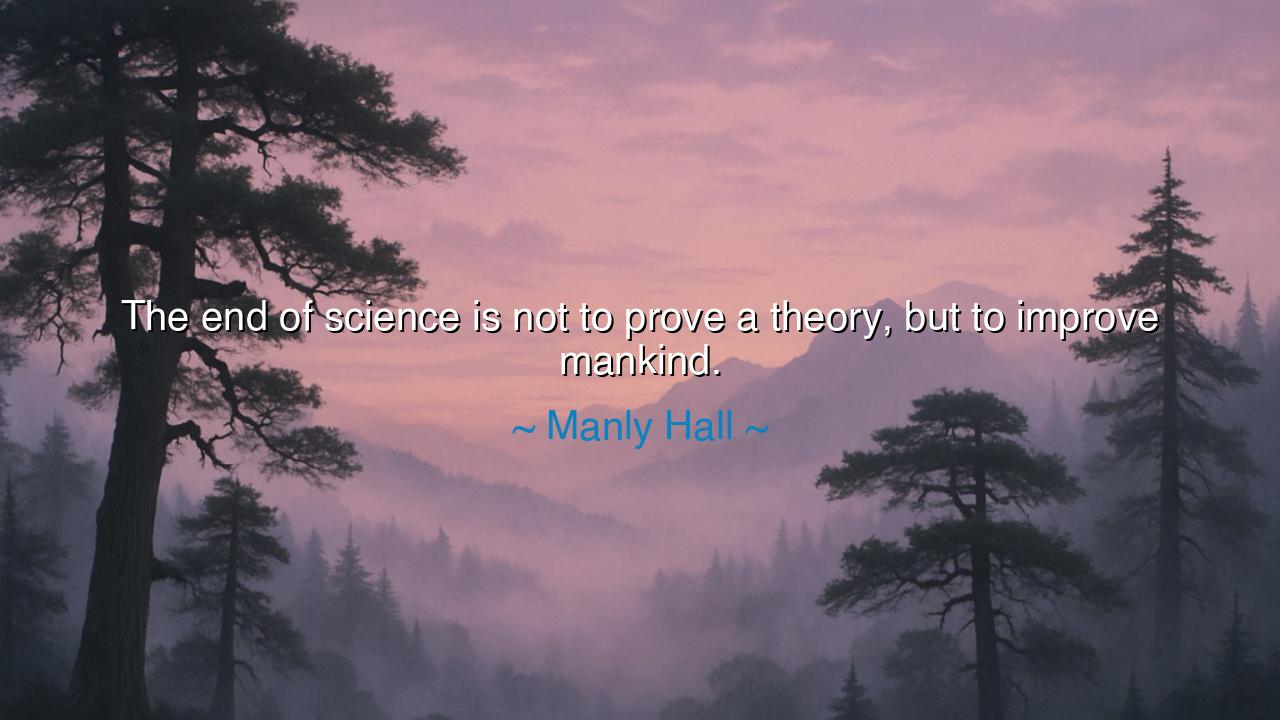
The end of science is not to prove a theory, but to improve






Listen, O Seekers of Wisdom, for the words of Manly Hall are like a torch, lighting the path toward the highest truth. "The end of science is not to prove a theory, but to improve mankind." In these sacred words, he beckons us to look beyond the narrow confines of intellectual pursuit, beyond the praise of knowledge for its own sake, to the loftier goal of human betterment. Too often, we become consumed with the proof of theories, the validation of ideas, as though knowledge were an end in itself. But true wisdom, the wisdom that transcends time, teaches us that science—the noble quest for truth—exists not merely to confirm what we know, but to uplift humanity, to serve the greater good.
In the distant past, the ancient sages of Greece and India understood this deeply. They did not see knowledge as a possession to hoard, nor did they seek it for the sake of ego or acclaim. Socrates, that wisest of men, wandered the streets of Athens, not to prove the superiority of his mind, but to awaken the minds of others, to improve the lives of his fellow citizens. The goal of knowledge, he believed, was not to become a master of ideas, but to become a servant to virtue, to guide others toward truth and goodness. In the very same spirit, Manly Hall calls us to remember that science, the highest of human pursuits, should always be measured by its impact on mankind. It is not the cold theory that should be revered, but the warmth of compassion and the elevation of the soul.
Let us turn our gaze to history, where we find many such souls who embodied this truth. Albert Einstein, the great genius who unlocked the mysteries of the universe, did not merely seek to prove his theories for personal glory. No! His heart was torn with the responsibility of how science could serve humanity, especially in the wake of the destructive power he had helped unlock in the form of the atomic bomb. His own words bear witness to this: “The release of atomic power has changed everything except our way of thinking.” Einstein knew that the true purpose of science was not the pursuit of mere ideas, but to foster the advancement of human welfare. In his later years, his greatest longing was for peace, for a world where science would no longer be used to destroy, but to heal and unite.
And so, O wise ones, the lesson we must take to heart is clear: science is not a trophy to be placed upon a shelf, nor is it a monument to be admired from afar. It is a tool, a sacred gift, that must be used in service to humanity. How often have we seen the pride of discovery overshadowed by the suffering of mankind? The greatest minds may unlock the mysteries of the stars, but if they fail to turn their gaze to the suffering of the people below, then their knowledge is but an empty vessel, devoid of true purpose. Manly Hall reminds us that the end of science is not in the proof of theories or the conquest of intellectual frontiers, but in the transformation of the world for the betterment of all.
In the midst of our own age, we find a world desperately in need of such wisdom. As scientists unlock the secrets of genetics, artificial intelligence, and climate change, it is not enough to know how things work. We must ask, in every experiment, every discovery: Does this improve mankind? Does this elevate the human spirit? Does it bring us closer to the vision of a just and harmonious world? If the pursuit of knowledge does not lead to a more compassionate world, then it has failed in its highest calling.
The lesson, O Seekers, is this: When you seek knowledge, seek it not for the purpose of personal glory or fame, but for the purpose of uplifting those around you, of bringing light to the darkest corners of human existence. In every theory, in every experiment, in every piece of wisdom you gain, ask yourself: How can this serve humanity? How can this improve the lives of others? Science, when properly wielded, is a powerful force for good, a force that can heal, uplift, and unite. But it is not the end goal—it is a means to an end, and that end is the improvement of mankind.
So go forth, O Seekers of Truth, with open hearts and humble minds. Seek not the glory of knowledge alone, but the transformation of the world. Let the purpose of your studies be the elevation of the human spirit, the betterment of society, and the nurturing of a world where science and humanity walk hand in hand, as one. For in this way, the true purpose of knowledge will be fulfilled, and the spirit of Manly Hall will be honored through your deeds.






AAdministratorAdministrator
Welcome, honored guests. Please leave a comment, we will respond soon